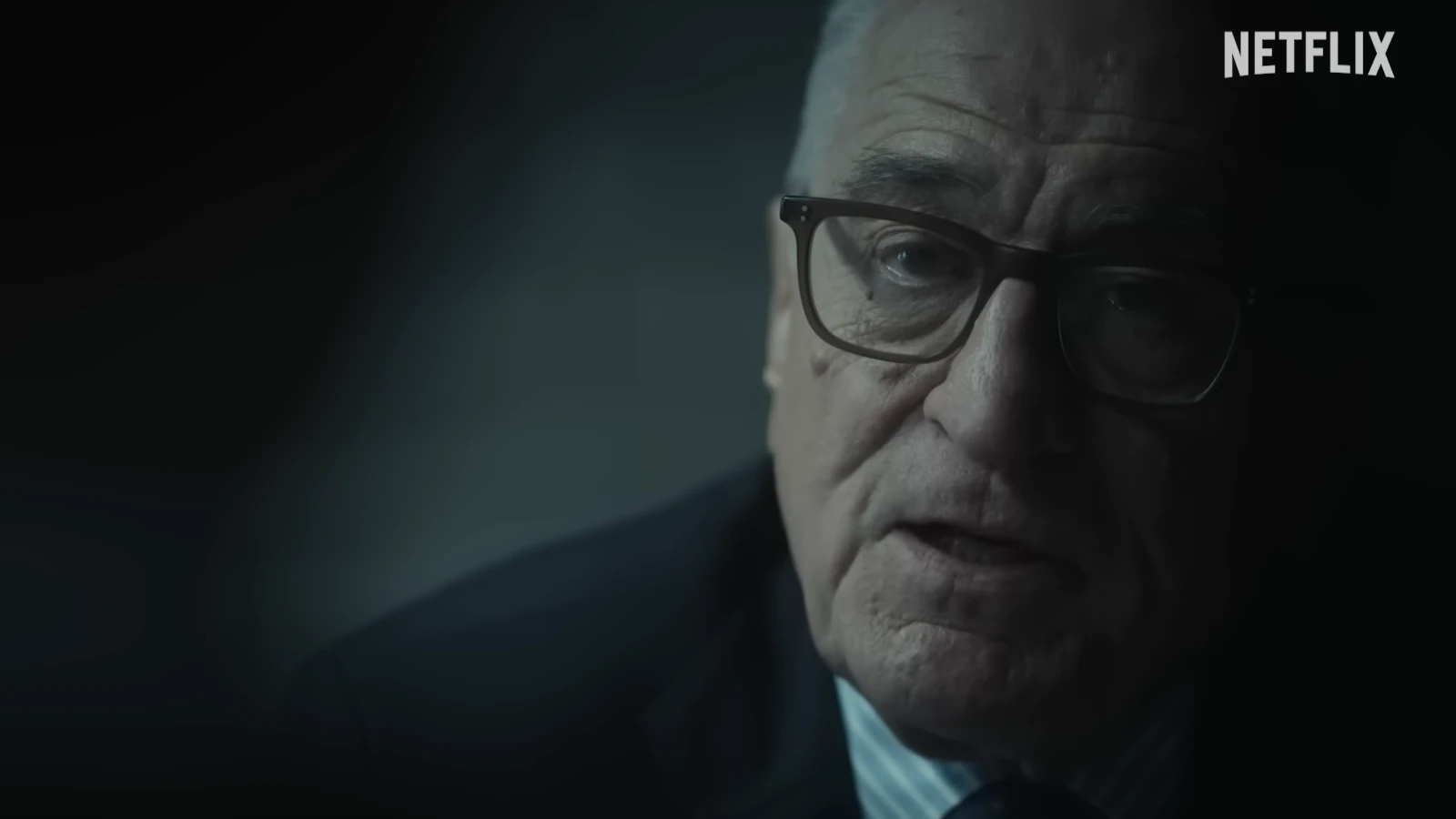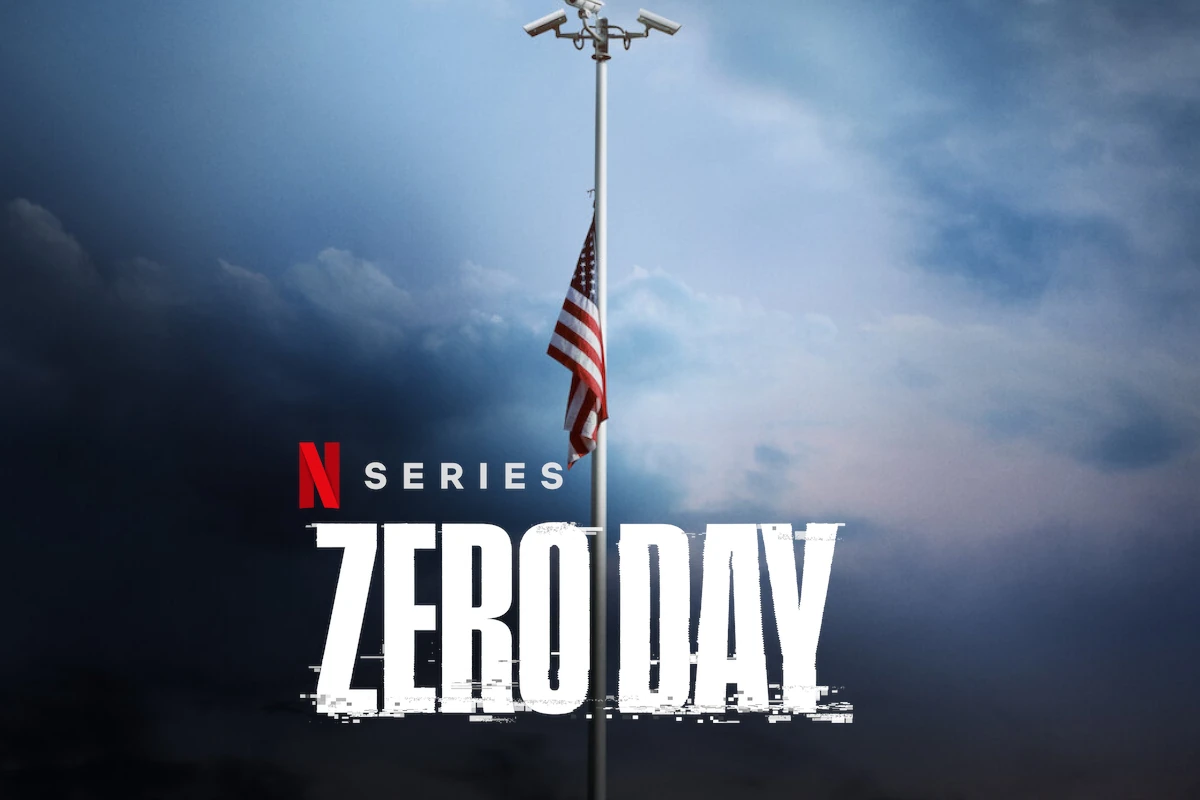Robert De Niro’s first major television role is making waves on Netflix. The political thriller “Zero Day” has debuted with impressive numbers, accumulating 19.1 million complete viewing equivalents (CVEs) in its opening. This strong performance places it as the 7th best debut for a new Netflix series released on a Thursday since June 2021.
The limited series features an ensemble cast including Jesse Plemons, Lizzy Caplan, and Connie Britton alongside De Niro, who portrays a former president tasked with investigating a nationwide cyberattack. Despite mixed critical reception, viewers are tuning in to see the legendary actor in this new format.
“Zero Day” arrives at a time when political thrillers resonate with audiences. The show’s atmosphere of division and distrust mirrors current societal tensions, while its high production values and star power help it stand out in Netflix’s crowded content library.
Zero Day’s Mixed Reception: Critics and Audiences Weigh In
While Netflix is no stranger to political thrillers, “Zero Day” has sparked more conversation than most thanks to its lead: Robert De Niro, making his small-screen debut in a leading role. His portrayal of former President George Mullen—a seasoned leader pulled back into the political fray after a crippling cyberattack—has earned both praise and scrutiny. The show’s gripping premise and real-world relevance set high expectations, but the reaction has been far from unanimous.
A Gripping Premise Anchored by Star Power
“Zero Day” opens with chaos: a coordinated cyberattack cripples infrastructure, causing multiple fatalities and throwing the U.S. into a state of panic. De Niro’s character is recruited to uncover the truth, offering a grounded and emotionally resonant performance that blends gravitas with quiet vulnerability. He’s not the power-wielding figurehead from his presidential days—he’s older, more cynical, and forced to navigate a political landscape filled with half-truths, disinformation, and powerful players hiding secrets.
That grounded character work is supported by a strong ensemble, including Lizzy Caplan, Jesse Plemons, and Connie Britton, each of whom brings subtlety to roles that could’ve easily felt one-note in a lesser production. The writing frequently leans into contemporary anxieties: the role of social media in spreading misinformation, the blurred lines between state actors and rogue agents, and the fragile trust the public places in its leaders.
Critics Are Split on Execution
Despite its timely themes and heavyweight cast, reviews for “Zero Day” have been all over the map. Some critics are calling it a “riveting, paranoia-fueled thriller” with echoes of classic conspiracy dramas. Others, however, have taken issue with its pacing, tonal shifts, and plot developments that occasionally veer into implausibility. At just six episodes, the series is compact, but some viewers feel it tries to do too much in too little time.
One frequent critique is that while the show’s ambitions are commendable, its storytelling sometimes struggles under the weight of its ideas. Themes of truth, propaganda, and political manipulation are explored, but not always fully developed. The central mystery—who’s behind the cyberattack, and why—is engaging, but a few narrative turns have been labeled as predictable or overly dramatic.

Audience Buzz and Streaming Success
In spite of the divided critical reception, “Zero Day” is resonating with viewers. Social media is buzzing with theories, scene breakdowns, and praise for De Niro’s layered performance. The show shot to the top of Netflix’s global charts within days of release, signaling strong initial engagement. Whether driven by curiosity about De Niro’s television debut or genuine interest in the show’s themes, it’s clear “Zero Day” has struck a nerve.
Audience reviews on major platforms reflect that divide as well—while some applaud the show’s thought-provoking narrative and taut atmosphere, others criticize it for lacking the payoff expected from such a high-profile production. Still, the conversation around the show is lively, and that in itself is a mark of success in today’s oversaturated content landscape.
What Zero Day Gets Right
- Timely Subject Matter: The fear of cyberwarfare and state-sponsored attacks feels incredibly current, and the show doesn’t shy away from those implications.
- A Leading Man in Command: De Niro brings authenticity, gravitas, and emotional weight that elevate the material, even when the plot stumbles.
- Atmosphere and Tone: The mood is consistently tense and somber, befitting the show’s themes of national crisis and political distrust.
Where It Stumbles
- Story Pacing: The show tries to cram a wide range of ideas and twists into six episodes, occasionally leaving plot threads underdeveloped.
- Predictable Beats: Certain revelations and character arcs feel telegraphed, reducing their impact when they finally arrive.
- Over-seriousness: At times, the show takes itself so seriously that it veers into melodrama, especially when tackling real-world political parallels.
The Verdict: A Worthwhile Watch with Room for Debate
“Zero Day” isn’t just another thriller—it’s a meditation on truth, leadership, and the fragile machinery of modern democracy. While not flawless, it offers a compelling blend of espionage, emotional drama, and social commentary, elevated by a commanding lead performance. Whether you love it or find it uneven, it’s hard to look away from what Netflix has put together here. For fans of political intrigue, complex characters, and real-world stakes, “Zero Day” is absolutely worth your time—even if it leaves you with more questions than answers.
Key Takeaways
- Robert De Niro’s “Zero Day” achieved 19.1 million CVEs, ranking 7th among Netflix Thursday releases since mid-2021.
- The political thriller features De Niro as a former president investigating a cyberattack, marking his first major television role.
- Despite mixed reviews, the series has attracted viewers with its relevant themes and prestigious ensemble cast.
Overview of ‘Zero Day’
Netflix’s political thriller “Zero Day” explores a devastating cyberattack and the subsequent investigation led by a former president. The six-episode limited series combines elements of conspiracy, political intrigue, and technological warfare in a narrative that feels particularly relevant to current times.
Plot and Setting
“Zero Day” centers on a catastrophic cyberattack that threatens national security. Former U.S. President George Mullen, played by Robert De Niro, is called back into service to lead a special commission investigating the attack. The story unfolds as Mullen and his team search for the truth behind who orchestrated the attack and why.
The series title refers to the “Zero Day” perpetrators, a mysterious group that uses CB radio as their communication method of choice. This old-school technology choice creates an interesting contrast with the high-tech nature of their cybercrimes.
The narrative builds tension through the six episodes, with revelations about the true culprits coming gradually. By the fifth episode, viewers discover a sitting congressperson’s involvement in the conspiracy, though Mullen himself doesn’t learn this until the sixth episode.
Cast and Characters
Robert De Niro leads the cast as George Mullen, a former president who struggles with mental health issues while attempting to uncover the truth. His performance anchors the series as he navigates complex political situations and personal challenges.
The character of Mullen faces difficult choices throughout the series, particularly in the finale where he must decide whether to reveal uncomfortable truths to the public. De Niro’s portrayal shows the character’s internal conflict between political expediency and honesty.
Supporting characters include members of Mullen’s investigative commission and various political figures who may or may not be involved in the conspiracy. The character dynamics reveal layers of trust, betrayal, and political maneuvering that complicate the investigation.
Production Team
“Zero Day” was created by Eric Newman and Noah Oppenheim, who brought significant experience to the political thriller genre. Their creative decisions, including the decision not to pursue a second season, reflect their commitment to telling a complete story within the six-episode format.
The production team crafted a narrative that feels “eerily timely,” according to reviewers. Their approach to the material balances fictional storytelling with elements that feel relevant to current technological and political concerns.
The creators have discussed their decision-making process for the series finale, explaining why De Niro’s character ultimately chooses to tell the truth despite potential political consequences. This commitment to character integrity shows the production team’s focus on meaningful storytelling over sensationalism.
Critical Reception and Performance
Critics have delivered mixed to positive reviews for Robert De Niro’s Netflix political thriller “Zero Day,” with particular praise for his performance as former U.S. President George Mullen.
Early Reviews and Ratings
Robert De Niro’s portrayal in “Zero Day” has garnered significant critical acclaim. Reviewers consistently highlight his “thoughtful performance” as a former president leading an investigation following a catastrophic cyber attack. At 81, this marks De Niro’s first major television role, which critics note as an “event” in itself.
The series has been described as a “gripping political thriller” that explores cyber warfare, government conspiracies, and the balance between leadership and authoritarianism. Some critics praised the early episodes for their strong start and suspenseful, “nail-biting” quality.
However, not all feedback has been entirely positive. Some reviews suggest the series suffers from being “self-serious” and faces pacing issues as it progresses, starting strong but potentially losing momentum in later episodes.
Box Office and Streaming Numbers
As a Netflix limited series, “Zero Day” doesn’t have traditional box office figures to report. The streaming platform typically doesn’t release comprehensive viewership data for individual titles.
The series’ release strategy followed Netflix’s standard approach for premium content, with all six episodes dropping simultaneously. This binge-release model aims to capitalize on the drawing power of De Niro’s first major television role.
Industry analysts are watching closely to see if the combination of De Niro’s star power and the political thriller genre will translate into strong streaming performance. The impressive ensemble cast, which includes Angela Bassett, Connie Britton, and Jesse Plemons, likely adds to the series’ audience appeal.
Netflix will measure success through viewer completion rates and the series’ ability to attract new subscribers. The limited series format offers the platform a prestige project with a definitive endpoint.
Role of ‘Zero Day’ in Current Political Context
Robert De Niro’s portrayal of a former U.S. president in Netflix’s “Zero Day” offers compelling commentary on America’s political landscape. The series explores themes of bipartisanship, presidential leadership, and modern threats through a fictional narrative that feels remarkably relevant to today’s challenges.
Reflections on Bipartisanship
“Zero Day” examines the complex nature of political cooperation in an increasingly polarized environment. De Niro’s character, former President George Mullen, is tasked with leading a commission following a terrorist attack, similar to a Patriot Act-style response.
The commission’s structure deliberately includes members from different political backgrounds, highlighting the challenges of bipartisan work during national crises. The series doesn’t shy away from showing the friction that emerges when different ideological perspectives clash over security measures.
Mullen’s approach to leadership emphasizes finding common ground despite deep divides. This portrayal resonates with viewers frustrated by real-world political gridlock, offering a nuanced look at how compromise might be achieved during extraordinary circumstances.
Nonpartisan Portrayal of U.S. President
What distinguishes “Zero Day” from other political thrillers is its commitment to presenting a nonpartisan presidential character. De Niro discussed this approach in interviews, noting that the series intentionally avoids identifying Mullen with a specific political party.
This creative choice allows the show to focus on universal leadership qualities rather than partisan talking points. Mullen is depicted as principled and thoughtful, concerned more with national welfare than political advantage.
The character faces his own decline alongside the nation’s challenges, adding personal stakes to the political drama. This humanizing element, highlighted by critics as one of the show’s strengths, creates a more three-dimensional portrait of presidential leadership than typically seen in political dramas.
Depiction of Extremists and Cybersecurity
“Zero Day” places cybersecurity threats at the center of its narrative, reflecting real-world concerns about digital vulnerabilities. The series portrays a sophisticated cyber attack that threatens national security, drawing parallels to actual concerns expressed by intelligence agencies.
Extremist groups in the show operate in both physical and digital realms, presenting a multi-faceted threat. The series explores how fringe ideologies can spread through online networks and materialize into tangible dangers.
President Mullen’s investigative commission grapples with balancing security measures against civil liberties, a tension that mirrors ongoing debates about surveillance powers. The show’s creators have been praised for crafting a narrative that feels “chillingly prescient” in its portrayal of these modern threats.
The finale, where De Niro’s character chooses truth over political expediency, suggests that integrity may be the most important quality in confronting extremism and security challenges.
Critical Themes and Motifs
“Zero Day” explores several profound themes through its political thriller narrative, examining the intersection of national security, personal freedom, and governmental power in an age of advanced technology and cyber threats.
Power and Surveillance
Robert De Niro’s portrayal of former President George Mullen highlights the complex relationship between leadership and surveillance in times of crisis. After a devastating cyberattack disables the power grid, causing planes to fall from the sky and traffic systems to fail, the government rapidly expands its monitoring capabilities.
The series questions who truly benefits from widespread surveillance. Is it for public protection or control? The Zero Day Commission, led by Mullen, gains unprecedented access to digital information under the guise of national security.
Digital privacy erodes as governmental powers expand. The show depicts how easily surveillance tools intended for crisis management can become permanent fixtures in society, with citizens gradually accepting this new normal.
The power grid vulnerability serves as both literal plot device and metaphor for societal fragility. When systems we depend on fail, who controls the response shapes our future freedoms.
The Ethics of Government Control
“Zero Day” examines the moral dilemmas faced by leaders when responding to national emergencies. De Niro’s character must balance swift action against potential overreach as he leads the special commission tasked with investigating the cyberattack.
The series delves into how crisis situations can justify exceptional government powers. Mullen’s commission operates with fewer checks and balances than normal democratic institutions would allow.
The show presents a nuanced view of leadership during emergencies. Rather than portraying purely heroic or villainous government figures, it shows officials navigating complex ethical territory with limited information.
De Niro’s performance captures the internal struggle of someone who understands both the necessity of strong leadership and the dangers of authoritarianism. His character represents the “righteous man with the courage to save the day” archetype while showing the human flaws that complicate such heroism.
Freedom vs. National Security
The tension between individual liberties and collective security forms a central conflict in “Zero Day.” As the threat of another cyberattack looms, citizens must decide how much freedom they’re willing to sacrifice for protection.
Civil liberties face increasing pressure throughout the series. Emergency powers granted to the federal government initially seem reasonable but gradually encroach on fundamental rights.
The show raises important questions about democratic values during crisis. When does temporary restriction of freedom become permanent erosion of rights? Who decides when the emergency is truly over?
Digital privacy emerges as a particular battlefield. The very technologies that might prevent future attacks also enable unprecedented government access to personal information. The series depicts this paradox without offering simplistic solutions.
Media manipulation plays a crucial role in shaping public perception. The show examines how fear can be weaponized to justify security measures that citizens might otherwise reject.
Cultural Impact and Legacy
“Zero Day” has quickly established itself as a significant entry in the political thriller genre, sparking conversations about media representation of political figures and the thin line between fiction and reality in our current political climate.
Influence on Contemporary Political Thrillers
“Zero Day” arrives at a time when political thrillers are evolving to address modern concerns about technology, misinformation, and democratic fragility. The series has been praised for its realistic portrayal of cyber threats, showing how a simple power grid attack can cause catastrophic consequences.
Robert De Niro’s portrayal of former President George Mullen brings gravitas to the political thriller genre that few actors could match. His performance sets a new benchmark for actors taking on political roles in television.
The show’s exploration of the relationship between technology corporations and government has resonated with viewers familiar with real-world tensions between Silicon Valley and Washington. This dynamic, represented through characters like Richard Dreyer, reflects growing public concern about tech influence on democracy.
Comparison to Works by Aaron Sorkin
“Zero Day” shares thematic elements with Aaron Sorkin’s “The American President,” but takes a darker, more pessimistic view of the presidency. While Sorkin’s work often idealizes political institutions, “Zero Day” examines their vulnerability.
The dialogue in the Netflix series lacks Sorkin’s trademark rapid-fire optimism, instead opting for tense exchanges that highlight the gravity of threats to democracy. This tonal shift reflects changed perceptions of American politics since Sorkin’s heyday.
Evelyn Mitchell’s character offers a counterpoint to typical Sorkin female characters. Rather than serving as a romantic interest or moral compass, Mitchell represents the complex ethical compromises of modern intelligence work.
Discussions on Fascism and Democracy
“Zero Day” has generated significant discourse about the fragility of democratic institutions. Critics have praised the show for addressing how fascism can emerge from democratic systems when trust in institutions erodes.
The series presents fascism not as an obvious external threat but as a gradual internal corruption of democratic processes. This subtle portrayal has made the show particularly relevant amid ongoing debates about democratic backsliding globally.
De Niro’s character’s journey reflects America’s struggle with its democratic identity. His performance has been called “eerily timely” as his character grapples with whether truth or national stability should take precedence.
The series doesn’t offer easy solutions to the threats it portrays. Instead, it leaves viewers questioning how democracy can defend itself against technological threats without becoming authoritarian—a question that resonates deeply in today’s political climate.
Behind the Scenes
The production of “Zero Day” brought together an experienced team to create Netflix’s political thriller starring Robert De Niro in his first leading TV series role. The show’s creation involved extensive research and collaboration among writers, directors, and actors to deliver an authentic portrayal of political crisis.
Adaptation from ‘The Diplomat’
“Zero Day” shares some creative DNA with “The Diplomat” through director Lesli Linka Glatter, who brought her political thriller expertise to both projects. Unlike many adaptations, “Zero Day” was developed as an original concept focusing on cybersecurity threats rather than traditional diplomatic conflicts.
The writing team spent months researching real-world cyber attacks to create a believable scenario. They consulted with former government officials to understand how a presidential task force would operate during such a crisis.
De Niro’s character, former President George Mullen, was partly inspired by accounts of past presidents dealing with cognitive issues while in office. This added complexity to the character without making it the central focus of the narrative.
Insights from the Writers’ Room
The writers’ room for “Zero Day” was led by co-creator and showrunner Eric Newman, who previously worked on “Narcos.” The team focused on the question: “What is truth in a post-truth world?”
This theme runs throughout the series as characters struggle to identify who was behind the devastating cyber attack. Writers deliberated extensively on how to balance political intrigue with human drama.
The show’s writing process involved creating complex conspiracy theories that feel plausible. The team worked to ensure the political aspects remained grounded in reality.
De Niro was involved in shaping his character’s backstory, particularly regarding Mullen’s past as a public servant and his current struggles with mental health. This collaborative approach helped create a more nuanced portrayal.
Actors’ Preparation for Political Roles
Robert De Niro prepared for his role as former President Mullen by meeting with former White House staffers and security experts. He studied presidential mannerisms and leadership styles to create a believable former commander-in-chief.
Lizzy Caplan and other cast members underwent similar research to understand the protocols and behaviors of high-level government officials during crisis situations. Many actors spent time with their real-world counterparts from agencies like Homeland Security.
The cast participated in mock press conferences and security briefings to develop the quick-thinking responses needed for their roles. These exercises helped create authentic interactions on screen.
De Niro faced the unique challenge of portraying a leader with cognitive issues while maintaining the character’s authority. He worked with medical consultants to ensure an accurate and respectful portrayal of mental decline in a high-pressure environment.
Audience Reception and Discussion
Since its February 20, 2025 release on Netflix, “Zero Day” has generated significant viewer engagement. The political thriller starring Robert De Niro has sparked conversations about cybersecurity threats and political leadership during national crises.
Fan Theories and Debates
Viewers have developed numerous theories about the true culprits behind the cyberattack portrayed in the series. Many fans speculate about hidden connections between De Niro’s character, former President George Mullen, and potential government conspiracies.
The bipartisan task force led by Mullen has become a focal point of debate. Fans discuss whether the show accurately portrays how political differences might be set aside during a national emergency.
Angela Bassett’s character has received particular praise from viewers who appreciate her portrayal of a strong leader amid chaos. Fan forums have analyzed her investigation methods and decision-making process throughout the series.
Some viewers have criticized plot holes in the investigation storyline, arguing that certain technological aspects of the cyberattack seem implausible. Others defend these creative liberties as necessary for dramatic storytelling.
Social Media Buzz and Trends
“Zero Day” has dominated Netflix’s trending charts since its release. The hashtag #ZeroDay has garnered millions of impressions across platforms, with viewers sharing reaction videos and memes about De Niro’s performance.
Many social media users have drawn parallels between the fictional crisis in “Zero Day” and real-world cybersecurity concerns. Cybersecurity experts have joined these conversations, offering their perspectives on the show’s technical accuracy.
The on-screen chemistry between De Niro and Bassett has generated significant buzz. Viewers have created compilation videos highlighting their most intense scenes together during the investigation.
Twitter polls show divided opinions on the show’s political messaging. Some viewers appreciate its bipartisan approach to crisis management, while others question whether it realistically portrays today’s polarized political landscape.
Implications for Future Series and Films
The success of “Zero Day” opens several avenues for Netflix and De Niro’s team to explore. The political thriller has struck a chord with audiences through its timely narrative about cybersecurity threats and political intrigue.
Potential for a Sequel or Spin-Off
Industry insiders report that Netflix executives are already discussing the possibility of extending “Zero Day” into a multi-season franchise. The show’s open-ended finale, featuring the mysterious Ultra-Wealthy figures behind the attack, provides a perfect setup for continuation.
The character of Evan Green, played by Jesse Plemons, could potentially lead a spin-off series focused on the technical aspects of cybersecurity threats. His character’s background in intelligence operations remains largely unexplored in the first season.
Netflix’s data-driven approach to renewals suggests that viewing figures from the first month will be crucial in determining the show’s future. Early numbers indicate strong audience retention throughout the six episodes.
Impact on Robert De Niro’s Career
De Niro’s first foray into television series work marks a significant career pivot at this stage of his legendary career. The role of former President George Mullen showcases his ability to portray complex authority figures with nuance and depth.
The success of “Zero Day” will likely lead to more streaming platform offers for De Niro. Several industry analysts predict a renewed interest in casting him for long-form storytelling projects rather than just feature films.
His portrayal of a president’s relationship with his Chief of Staff (played by Lizzy Caplan) has been particularly praised for its authenticity. This dynamic could influence how political relationships are depicted in future productions.
Influence on Upcoming Political Narratives
“Zero Day” has set a new benchmark for political thrillers by blending realistic cybersecurity threats with character-driven storytelling. Production companies are reportedly fast-tracking similar concepts focusing on technological vulnerabilities within government systems.
The show’s exploration of the Ultra-Wealthy as shadow power brokers offers a template for more complex villain structures in political dramas. Rather than singular antagonists, the distributed threat model provides richer storytelling possibilities.
Several streaming platforms have already greenlit productions examining the intersection of politics, technology, and wealth. The depiction of how former political figures can be recalled to service during national emergencies presents a compelling narrative device that will likely be adopted by other productions.
Frequently Asked Questions
Viewers and critics have raised several key questions about “Zero Day” since its Netflix release. The limited series has generated substantial discussion about its political themes, cybersecurity focus, and De Niro’s return to television.
What genre does ‘Zero Day’ fall under?
“Zero Day” is a political thriller with strong elements of cybersecurity drama. The six-episode limited series explores the aftermath of a devastating cyberattack through the perspective of former president George Mullen, played by Robert De Niro.
The show blends elements of conspiracy theories, political intrigue, and technological threats. Its narrative tackles contemporary issues of disinformation and fact distortion in modern society.
How has ‘Zero Day’ performed at the box office?
As a Netflix original series, “Zero Day” wasn’t released in theaters and therefore doesn’t have traditional box office figures. The streaming platform typically measures success through viewership numbers rather than ticket sales.
Initial reports suggest strong viewership performance on the platform. The combination of De Niro’s star power and the timely political themes has attracted substantial audience interest since its release.
Who directed ‘Zero Day’ and can viewers expect a similar style to previous films?
“Zero Day” was created by Eric Newman and Noah Oppenheim, with different directors handling individual episodes. The series represents a collaborative creative effort rather than having a single directorial vision.
The show’s style differs from De Niro’s typical film work, embracing the extended storytelling format of prestige television. Its approach focuses on slow-burning tension and character development across multiple episodes.
What has been the critical reception of ‘Zero Day’?
Critics have noted the “eerily timely” nature of the political thriller. Many reviews highlight De Niro’s performance as former president George Mullen, particularly his portrayal of a character dealing with mental decline while investigating a national crisis.
The series has received praise for its exploration of truth in an era of subjective facts. Some critics have specifically pointed to the powerful finale where De Niro’s character must decide whether to tell the truth despite significant political pressure.
Are there any notable co-stars in ‘Zero Day’ alongside Robert De Niro?
The series features an impressive supporting cast alongside De Niro. While specific details about all cast members aren’t mentioned in the search results, the production is described as having “a quite stellar cast.”
The ensemble nature of the show allows for multiple character perspectives on the central crisis. These different viewpoints help build the complex political landscape within which De Niro’s character must navigate.
What themes does ‘Zero Day’ explore through its narrative?
“Zero Day” examines the fragility of truth in contemporary society. The series repeatedly references the distinction between facts and truth, particularly through De Niro’s character who states, “Those are the facts, but not the truth.”
The narrative tackles disinformation, cybersecurity threats, and political manipulation. It also explores personal struggles, as George Mullen experiences hallucinations that make him question his own perception of reality.
The show presents a world where information can be weaponized and facts have become subjective. This theme resonates with current social concerns about determining what is real in an increasingly complex information landscape.







